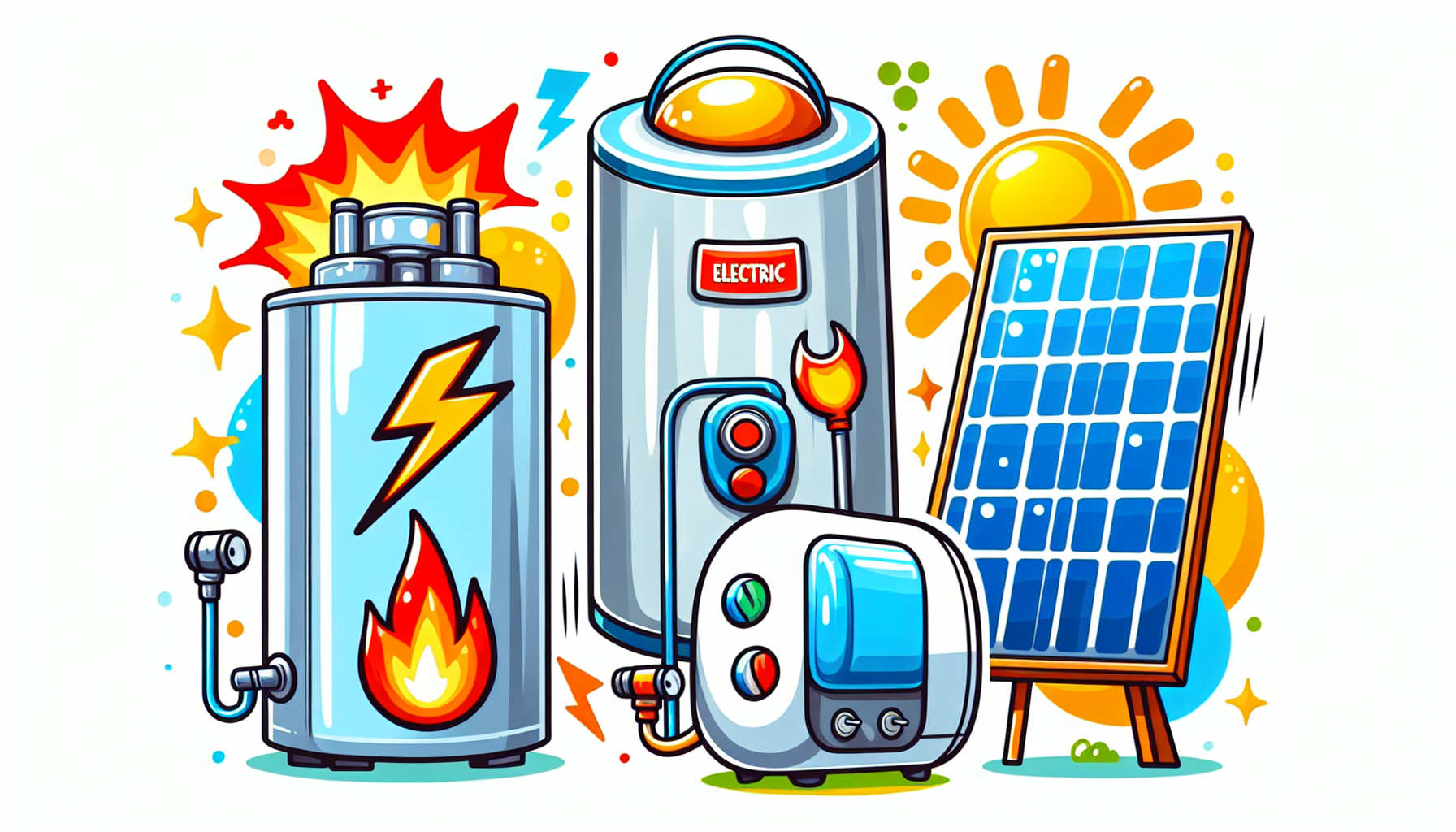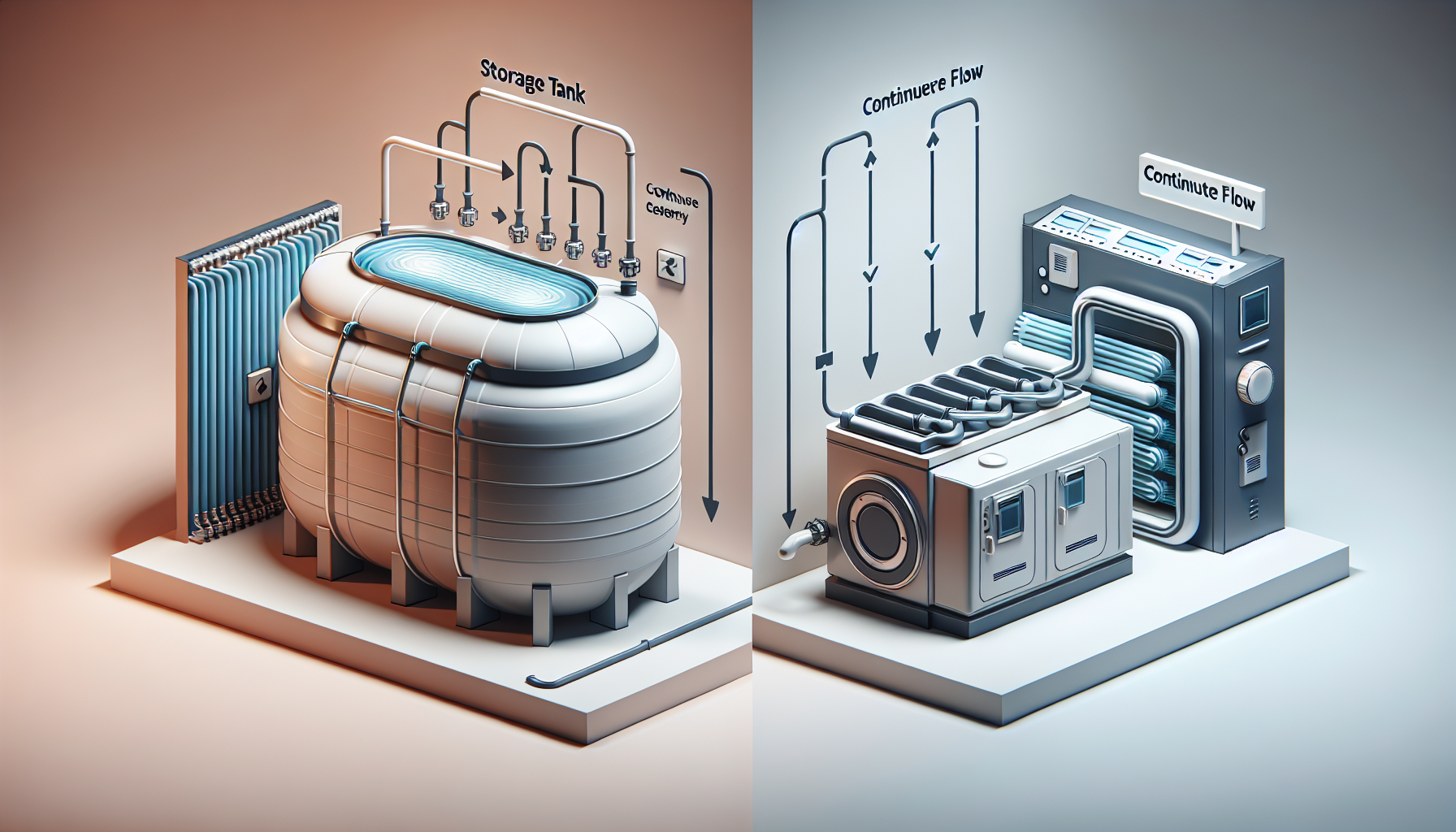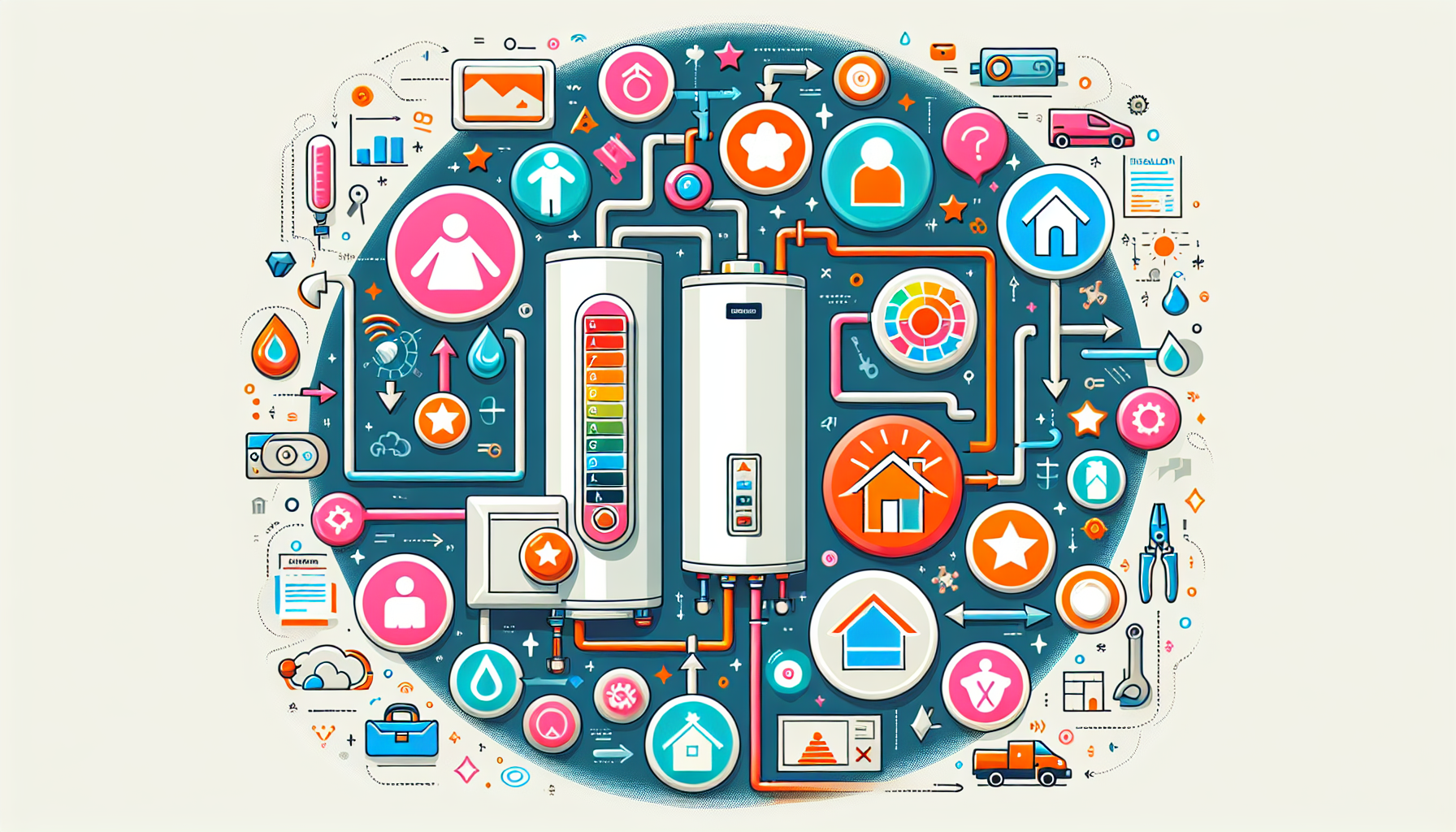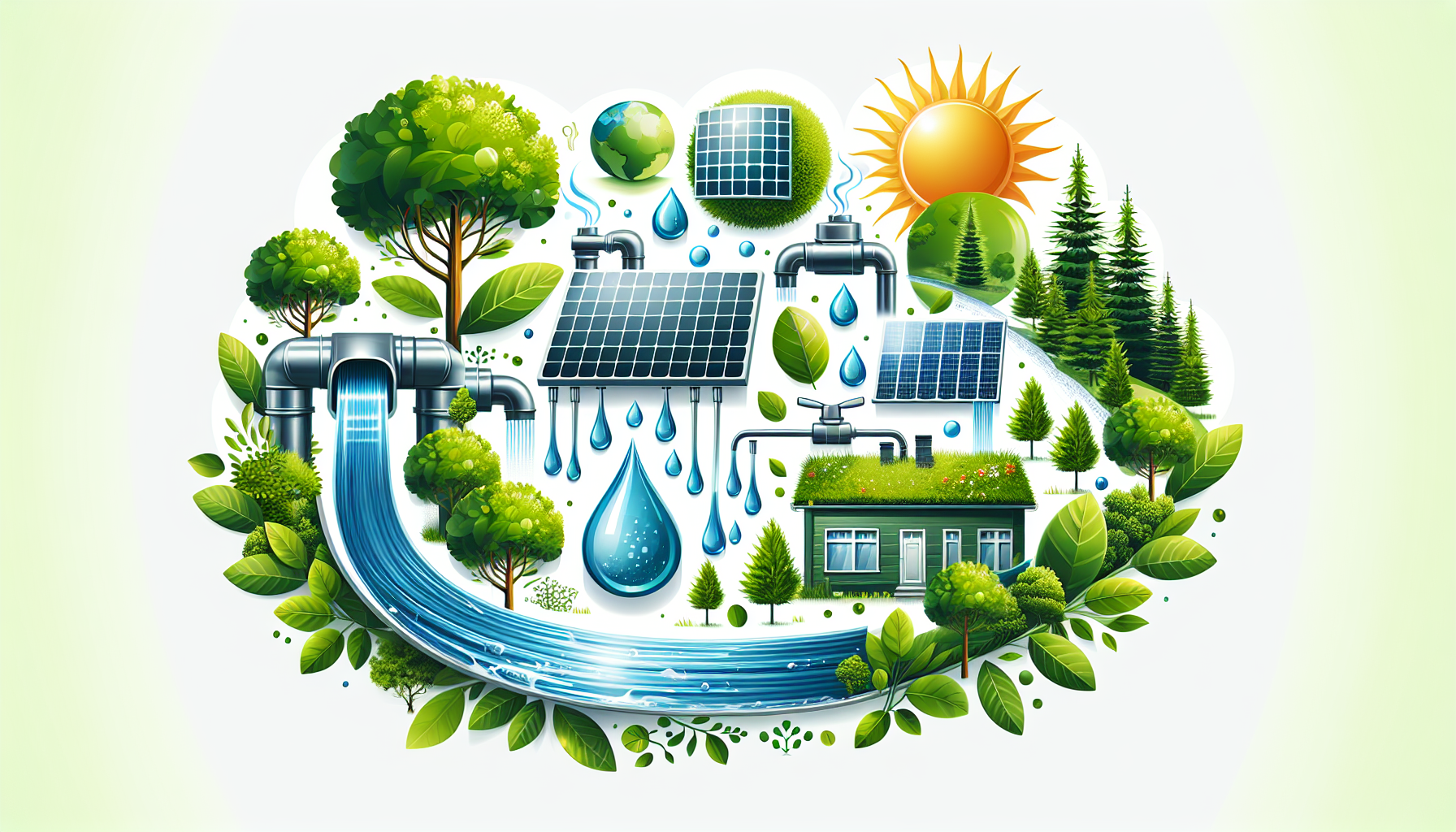Top Choices for Hot Water Heater Systems
Looking to pick the best hot water heater systems for your home? This guide covers electric, gas, solar, and heat pump systems, explaining their pros and cons to help you make an informed choice.
Key Takeaways
-
Hot water heater systems come in various types, including electric, gas, solar, and heat pump, each with distinct advantages and operational considerations.
-
Choosing the best hot water system for your home requires assessing household size, energy efficiency ratings, and budget constraints.
-
Rebates and incentives from federal and state programs can significantly reduce the costs associated with installing energy-efficient hot water systems.
Types of Hot Water Heater Systems

Hot water systems come in various forms, each with its unique benefits and drawbacks. Choosing the right type involves assessing your household’s hot water needs, budget, and environmental impact preferences. The main types of hot water systems include:
-
Electric
-
Gas
-
Solar
-
Heat pump systems
Each utilizes different energy sources to heat water.
Finding the most efficient hot water system for your home requires understanding the specific features and capabilities of each type. Electric hot water systems, for instance, are known for their ease of installation and reliability, while gas hot water systems offer faster heating times and lower operating costs. Solar hot water systems harness renewable energy to reduce both energy bills and carbon footprint, while heat pump systems are celebrated for their high efficiency and suitability in various climates.
Evaluating the pros and cons of each type is essential in making an informed decision. Understanding their unique characteristics will help you determine the best fit for your household.
Electric Hot Water Systems
Electric hot water systems are a popular choice due to their simplicity and reliability. These systems typically include storage, instantaneous, and solar-powered options. Standard electric storage water heaters contain a heating element inside the tank. This design allows for a reliable and consistent supply of hot water. They are generally cheaper to buy and easier to install compared to other types, making them a convenient option for many households.
However, electric instantaneous water heaters, while efficient in providing hot water on demand, tend to have higher running costs compared to storage systems operating on off-peak tariffs. Additionally, current regulations can limit installation options for electric storage systems in various homes, making it crucial to check local regulations before deciding on this type of system.
Despite these challenges, approximately 50% of Australian households utilize electric instantaneous water heaters, highlighting their widespread adoption.
Gas Hot Water Systems
Gas hot water systems are known for their quick heat recovery time and lower operational costs compared to electric models. These systems can be powered by natural gas or LPG, with natural gas being the more economical choice. Gas storage heaters, although more expensive initially, tend to be more cost-effective in the long run due to their lower running costs and higher efficiency.
One of the significant advantages of gas hot water systems is their lower carbon emissions compared to electric systems, making them a more environmentally friendly option. However, it’s important to consider that gas systems still rely on fossil fuels, which contribute to greenhouse gas emissions, albeit to a lesser extent than non-renewable electric systems.
Solar Hot Water Systems
Solar hot water systems use solar collectors. These collectors absorb energy from the sun to heat water. These systems typically consist of solar panels or evacuated tubes along with a storage tank to store the heated water. There are two main types of solar collectors: flat plate collectors and evacuated tube systems, with the latter generally being more efficient.
Solar hot water systems can significantly reduce hot water bills by relying on a renewable energy source, and a solar hot water system can provide up to 90% of a household’s hot water needs, depending on the climate. However, the initial cost of purchase and installation can be high, although various financial incentives such as Small-scale Technology Certificates (STCs) and rebates are available to help offset these costs.
Heat Pump Hot Water Systems
Heat pump hot water systems are renowned for their energy-efficient operation, often achieving up to a 70% reduction in energy consumption compared to traditional systems. These systems work by extracting heat from ambient air to heat water, making them highly efficient and cost-effective. Heat pump systems can be arranged as integrated or split systems, depending on the specific setup and requirements of the household. Heat pump water heaters can also be a great option for those looking to improve their hot water systems.
One of the key advantages of heat pump systems is their lower operational costs and reduced greenhouse gas emissions. However, they are best suited for mild climates, typically operating efficiently within temperature ranges between 40°F to 90°F. In colder climates, their efficiency can drop, making them less ideal in such conditions.
Storage Tank vs. Continuous Flow Systems

When it comes to hot water systems, one of the key decisions homeowners face is choosing between storage tank and continuous flow systems. Storage tank systems store a finite amount of hot water and need to reheat after the supply is exhausted, while continuous flow systems deliver hot water on demand without the need for storage. Each system has its own set of advantages and drawbacks, depending on household needs and preferences.
Understanding the differences between these two systems is crucial for making an informed decision. Exploring the specifics of both will help you determine which type best suits your household’s hot water requirements.
Storage Tank Systems
Storage tank systems are a traditional choice for many households. These gas storage systems can operate under mains pressure or gravity feed, and they are typically sized based on the number of users in the household to ensure an adequate hot water supply. Gas storage heaters heat water more quickly than electric storage systems. Additionally, they usually require a smaller tank.
A notable drawback of storage water heaters is substantial heat losses, which can waste about 30% of energy. This can be mitigated by using insulation blankets and minimizing pipe lengths to reduce heat loss. Additionally, choosing the right-sized tank is important to avoid excessive operating costs and ensure efficiency.
Continuous Flow Systems
Continuous flow systems, also known as instantaneous water heaters, heat water as needed without a storage tank. These systems activate heating when a hot tap is turned on, ensuring a continuous supply of continuous flow hot water without the risk of running out. A continuous flow system is compact and typically has a longer lifespan than traditional storage tanks.
These systems are sized according to the number of hot water outlets in the home and can be powered by natural gas, LPG, or electricity. One of the main advantages of continuous flow systems is their efficiency and ability to provide hot water on demand, making them suitable for households with varying hot water needs.
Factors to Consider When Choosing a Hot Water Heater System

Selecting the right hot water heater system involves evaluating several key factors, including household needs, energy efficiency, and budget for both installation and ongoing costs. New federal regulations have driven improvements in energy efficiency for gas and electric tank models, making environmentally conscious choices more accessible.
Energy-efficient systems such as solar and heat pumps can lead to significant savings on energy bills and often qualify for government incentives. Additionally, continuous flow systems can last up to 20 years due to their easily replaceable parts, potentially reducing maintenance costs over time. However, during high demand, these systems may experience delays in supplying hot water, which is something to consider for larger households.
Consider these specific factors to ensure you choose the most suitable hot water system for your home.
Household Size and Water Usage
Household size and water usage are critical factors in selecting a hot water system. Daily water consumption patterns, particularly for activities like showering, can greatly influence the sizing of the water heater. To ensure an adequate hot water supply, it’s essential to analyze home usage and choose a system that matches the household’s needs.
Choosing the right-sized hot water system is crucial for efficiency. An oversized system can lead to excessive operating costs, while an undersized system may not provide enough hot water, causing inconvenience. Properly sizing the system based on household needs ensures both efficiency and cost-effectiveness.
Energy Efficiency Ratings
Energy efficiency ratings are a vital consideration when choosing a hot water system. These ratings help consumers identify systems that minimize energy consumption, leading to lower energy bills and a reduced carbon footprint. Always look for energy efficiency ratings to ensure you select an energy-efficient option.
Minimum Energy Performance Standards (MEPS) are in place for electric hot water storage systems, gas hot water storage, and gas instantaneous systems. They aim to enhance the energy efficiency of these systems. By choosing systems that meet or exceed these standards, homeowners can contribute to environmental conservation while enjoying the benefits of lower running costs.
Installation and Maintenance
Proper installation and regular maintenance are crucial for the optimal performance and longevity of hot water systems. Hiring licensed professionals for installation ensures compliance with safety standards and proper functioning. Choosing a licensed professional guarantees the job is done correctly.
Regular maintenance, such as replacing the sacrificial anode rod in storage tanks every few years, can prevent corrosion and extend the system’s lifespan. The lifespan of storage hot water systems generally ranges from 10 to 15 years, depending on maintenance and water quality. Ensuring proper installation and maintenance can help avoid costly repairs and ensure the system operates efficiently for its intended lifespan.
Rebates and Incentives for Hot Water Systems

Rebates and incentives can significantly reduce the cost of installing a new hot water system. Both federal and state programs offer financial assistance to promote energy efficiency and the adoption of renewable energy sources. These incentives can make the initial investment in a high-efficiency system more affordable and encourage the use of sustainable technologies.
By taking advantage of these programs, homeowners can lower their upfront costs and ongoing expenses associated with hot water systems. Explore the various federal and state schemes available to maximize your savings.
Federal Schemes
The federal government provides several incentives for heat pump hot water systems through small-scale technology certificates (STCs). These certificates can be traded for cash or used as a discount on the purchase price of renewable energy systems. Local hot water system installers can provide advice about available rebates and help homeowners navigate the process.
Homeowners can find available rebates and incentives by using the federal government energy rebate website and entering their state and area details. Regularly checking this site or consulting with local installers helps stay updated on the latest rebates and maximize savings.
State Programs
State programs also offer financial assistance for the installation and operation of hot water systems, promoting energy efficiency and renewable energy. These programs provide rebates and incentives to consumers, making it more affordable to invest in high-efficiency systems.
Participating in state-level programs can significantly lower the upfront costs and ongoing expenses associated with hot water systems. These incentives benefit individual households and contribute to broader environmental conservation efforts.
Environmental Impact and Sustainability

The environmental impact of hot water systems is a significant consideration for many homeowners. Energy-efficient hot water systems can significantly reduce a household’s carbon footprint by consuming less electricity or gas and conserving natural resources. Reducing hot water use can also help mitigate greenhouse gas emissions, contributing to a more sustainable future.
With water heating accounting for about 18% of the average household’s energy budget, choosing energy-efficient systems is crucial for both cost savings and environmental conservation. Exploring how different hot water systems impact the environment can help in making sustainable choices.
Reducing Greenhouse Gas Emissions
Hot water systems account for up to 25% of greenhouse gas emissions from an average Australian home. Natural gas water heaters emit less greenhouse gas emissions compared to electric water heaters that use non-renewable energy, making them a better option for reducing environmental impact. To minimize energy costs and emissions, consider alternative options to electric instantaneous water heaters.
Heat pump hot water systems are particularly effective in reducing greenhouse gas emissions, as they use less energy and result in lower energy bills. Integrating renewable energy sources, such as solar panels, can further reduce or even eliminate greenhouse gas emissions from hot water systems.
Active systems utilizing renewable energy are more effective in reducing greenhouse gas emissions, especially when equipped with well-insulated tanks and pipes compared to passive systems.
Renewable Energy Options
Heat pumps are among the most energy-efficient hot water solutions, consuming only a third of the energy of traditional electric storage heaters. High-efficiency solar hot water systems also offer lower running costs and reduced greenhouse gas emissions, despite higher upfront costs.
Utilizing renewable energy for hot water systems not only reduces reliance on fossil fuels but also lowers electricity bills and contributes to a more sustainable future. Solar hot water systems and heat pump systems are excellent choices for homeowners looking to invest in renewable energy options that provide long-term savings and environmental benefits.
Common Issues and Troubleshooting
Despite the advancements in hot water systems, common issues can still arise. Understanding these problems and knowing how to troubleshoot them can save homeowners both time and money. Unusual noises, no hot water, and leaks or drips are some of the most frequent issues encountered with hot water systems.
Proper maintenance and regular inspections can prevent many of these problems. The following subsections explore common issues and provide troubleshooting tips to keep your hot water system running smoothly.
No Hot Water
Experiencing no hot water can be frustrating, and it may be caused by several factors. Some instantaneous flow gas units may shut down for safety reasons at low flow rates, leading to a lack of hot water. To check if an active hot water system is working properly, turn off the boost in summer to see if the pump is functioning correctly.
If issues persist, contacting professional services like Rheem’s 24/7 emergency maintenance and repair services can be a reliable solution. Their emergency support team can help resolve any problems and ensure your hot water system is back up and running efficiently.
Leaks and Drips
Leaks and drips in hot water systems often result from loose connections due to vibrations or temperature changes. Identifying and fixing these leaks promptly is crucial to prevent damage and inefficiency. Regular maintenance and inspections can help identify loose connections before they lead to leaks, ensuring the longevity and efficiency of the hot water system.
Leaks not only lead to water wastage but can also cause significant structural damage and increase energy costs due to inefficiency. Addressing leaks as soon as they are detected can save money and prevent more severe issues down the line.
Unusual Noises
Unusual noises in hot water systems can be indicators of underlying issues that require immediate attention. Water hammer, which results from sudden changes in water flow, can create loud banging noises in the system. Pipes expanding and contracting with temperature changes can also produce creaking or ticking sounds.
To troubleshoot these noises, check for pressure relief valve issues, inspect pipes for expansion, and ensure proper air venting. If problems persist, professional services like those provided by 1st Choice Group, with their extensive experience and comprehensive approach to repairs, can diagnose and fix any issues related to unusual noises in hot water systems.
Summary
Choosing the right hot water heater system is essential for ensuring an adequate hot water supply, minimizing energy costs, and reducing environmental impact. By understanding the different types of hot water systems available—electric, gas, solar, and heat pump systems—and considering factors such as household size, energy efficiency, and installation and maintenance requirements, homeowners can make informed decisions that best suit their needs.
Utilizing available rebates and incentives can significantly lower the upfront costs of installing a new, energy-efficient hot water system. Prioritizing systems that reduce greenhouse gas emissions and utilize renewable energy options can contribute to a more sustainable future. Regular maintenance and proper troubleshooting are key to ensuring the longevity and efficiency of any hot water system.
Frequently Asked Questions
What is the most efficient hot water heating system?
The most efficient hot water heating system is a heat pump water heater, which can be 2-3 times more energy efficient than traditional electric systems. These heaters work best in mild to hot climates by extracting heat from the air to heat the water.
What is the primary power source for electric hot water systems?
The primary power source for electric hot water systems is a 240-volt electricity supply. This connection is typically available in most homes.
How do electric storage tank systems compare in running costs to gas or solar models?
Electric storage tank systems typically have lower running costs than gas or solar models, making them a more economical choice for many consumers.
What percentage of typical household energy consumption is used for water heating?
Approximately 25% of typical household energy consumption is used for water heating.
What is a benefit of using electric water heaters that source electricity from renewable resources?
Using electric water heaters powered by renewable resources significantly reduces environmental impact, promoting sustainability and lowering carbon footprints. This makes them a more eco-friendly choice for consumers.


























